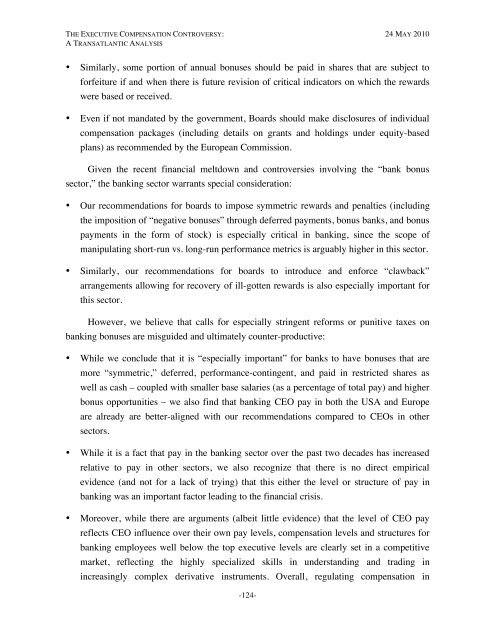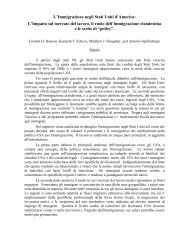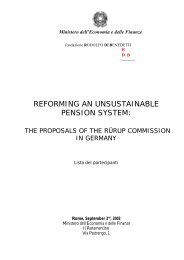The Executive Compensation Controversy - Fondazione Rodolfo ...
The Executive Compensation Controversy - Fondazione Rodolfo ...
The Executive Compensation Controversy - Fondazione Rodolfo ...
Create successful ePaper yourself
Turn your PDF publications into a flip-book with our unique Google optimized e-Paper software.
THE EXECUTIVE COMPENSATION CONTROVERSY: 24 MAY 2010A TRANSATLANTIC ANALYSIS• Similarly, some portion of annual bonuses should be paid in shares that are subject toforfeiture if and when there is future revision of critical indicators on which the rewardswere based or received.• Even if not mandated by the government, Boards should make disclosures of individualcompensation packages (including details on grants and holdings under equity-basedplans) as recommended by the European Commission.Given the recent financial meltdown and controversies involving the “bank bonussector,” the banking sector warrants special consideration:• Our recommendations for boards to impose symmetric rewards and penalties (includingthe imposition of “negative bonuses” through deferred payments, bonus banks, and bonuspayments in the form of stock) is especially critical in banking, since the scope ofmanipulating short-run vs. long-run performance metrics is arguably higher in this sector.• Similarly, our recommendations for boards to introduce and enforce “clawback”arrangements allowing for recovery of ill-gotten rewards is also especially important forthis sector.However, we believe that calls for especially stringent reforms or punitive taxes onbanking bonuses are misguided and ultimately counter-productive:• While we conclude that it is “especially important” for banks to have bonuses that aremore “symmetric,” deferred, performance-contingent, and paid in restricted shares aswell as cash – coupled with smaller base salaries (as a percentage of total pay) and higherbonus opportunities – we also find that banking CEO pay in both the USA and Europeare already are better-aligned with our recommendations compared to CEOs in othersectors.• While it is a fact that pay in the banking sector over the past two decades has increasedrelative to pay in other sectors, we also recognize that there is no direct empiricalevidence (and not for a lack of trying) that this either the level or structure of pay inbanking was an important factor leading to the financial crisis.• Moreover, while there are arguments (albeit little evidence) that the level of CEO payreflects CEO influence over their own pay levels, compensation levels and structures forbanking employees well below the top executive levels are clearly set in a competitivemarket, reflecting the highly specialized skills in understanding and trading inincreasingly complex derivative instruments. Overall, regulating compensation in-124-









